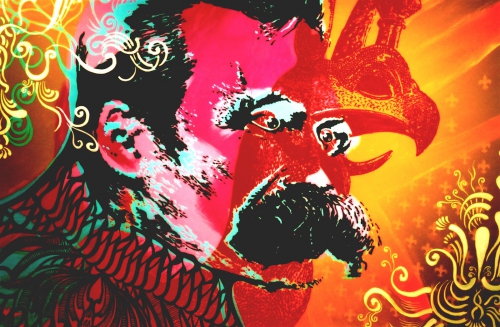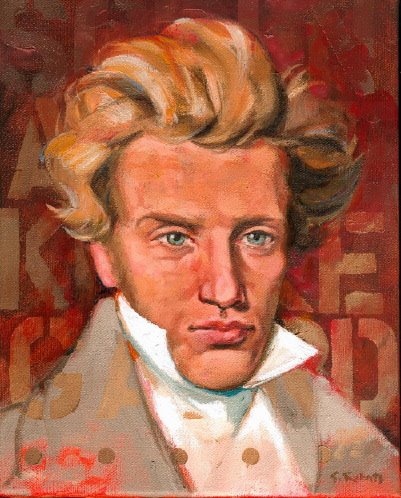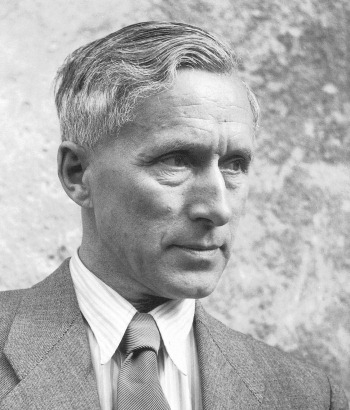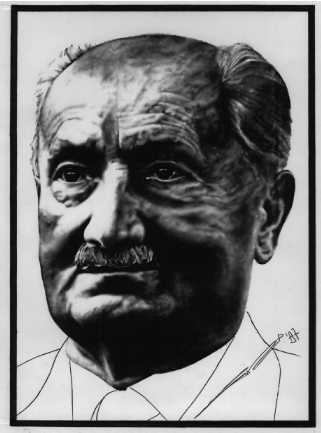jeudi, 19 février 2015
Notes on Nihilism

Notes on Nihilism
By Greg Johnson
Ex: http://www.counter-currents.com
It is often said that nihilism is one of the leading characteristics of the modern age, but what is nihilism? Nihilism means something like the “death” of God, the denial of objective meaning and value, the erasure of moral distinctions and hierarchies, the dissolution of a common world into individual perspectives, and the dissolution of a common culture into subjective “given preferences.”
Nietzsche defines nihilism as the devaluation of the highest values, the core values, of a civilization. On that account, to understand nihilism we must, therefore, grasp: (1) the nature of values, (2) the role of values in life, (3) the nature of the claim that values make upon us, and (4) how it is possible for values to lose their claim upon us. I propose that we answer these questions through an examination of four thinkers: Giambattista Vico (1668–1744), Søren Kierkegaard (1813–1855), Friedrich Nietzsche (1844–1900), and Ernst Jünger (1895–1998).
Nietzsche on Life and Values
Nietzsche called the ultimate constituent of the world Will to Power. This is a highly anthropomorphized name for something that is neither a will (for there is no agent behind it that wills) nor is it “to power” (for it is not directed toward the goal of power, or any other goal). Will to Power is Nietzsche’s name for chaos, which he conceived of as a virtual infinity of points of force charging and discharging entirely without pattern or purpose.
Chaos somehow gives rise to life, life to consciousness, and consciousness to self-consciousness. Self-consciousness, however, presents a problem for life, because self-conscious beings demand reasons for continuing to live; they demand meaning and purpose in life. And this is a demand that chaos cannot meet. In a world of chaos, all options are equal. Nothing is any better or any worse than anything else. No option is preferable to any other. Choosing is not preferable to not choosing. Action, therefore, is fundamentally irrational. There is no reason to get out of bed in the morning. There is no reason to prefer continued existence to non-existence. Nothing matters. Nothing makes a difference. This is a condition so terrifying to self-conscious beings that they are annihilated when they encounter it directly.
Life, however, goes on. It preserves itself behind the back of consciousness by manufacturing values. These manufactured values are fictions which consciousness mistakenly thinks it discovers as objective facts. Fictional though they may be, values change everything. Once values are created, some things show up as better than others; some actions show up as better than others; some things show up as goals to be pursued; others show up as evils to be avoided. Life takes on meaning, purpose, and structure. Things begin to make a difference. One suddenly has a reason to get out of bed in the morning. Life can go on. The truth of chaos is a truth that kills. But the lie of values is a lie that we can live with. It is a necessary lie, a noble lie.
For Nietzsche, nihilism results when the core values of a culture cease being believed. There are two types of nihilism: passive and active. The passive nihilist deeply identifies with the core values of his civilization. Thus be experiences their loss as demoralizing and devitalizing. The active nihilist primarily experienced the reigning values as impediments to the freedom of his desires and imagination. Therefore, he experiences their downfall as liberating. For Nietzsche, the age of nihilism will be terminated by a particular kind of active nihilism: setting up and imposing new core values for a new civilization.
Vico & Cassirer
At this point, I wish to add an aside on the accounts of the origins of language, myth, and culture offered by Giambattista Vico (1668–1744) and Ernst Cassirer (1874–1945), for I think that these naturalistic accounts are broadly compatible with Nietzsche’s account of the origins of values and they supplement it nicely by describing the concrete embodiment of values in language, myth, and culture. Vico and Cassirer give essentially the same account of the origin of language and myth, for both hold that the first words were proper names of gods, and around these names grew up mythologies and languages which formed the cores of cultures.
 Vico offers a wonderful myth to illustrate the origins of language and myth. After the biblical flood, when the Earth was drying out and slowly re-populating, the sons and grandsons of Noah went back to nature, becoming very much like the Natural Man described in Rousseau’s Discourse on the Origins of Inequality. They lost all arts and sciences, organized families and communities, myth and religion, and even the use of language. And, because they also lost personal cleanliness and wallowed in their own urine and feces, Vico claimed—in accordance with an old wives’ tale then current in his hometown of Naples—they grew to a gigantic stature. Thus Vico offers us a picture of giants, devoid of language and culture, without families or cities, wandering alone in a vast forest that covered the drying Earth, occasionally bumping into one another and fornicating and then going their separate ways.
Vico offers a wonderful myth to illustrate the origins of language and myth. After the biblical flood, when the Earth was drying out and slowly re-populating, the sons and grandsons of Noah went back to nature, becoming very much like the Natural Man described in Rousseau’s Discourse on the Origins of Inequality. They lost all arts and sciences, organized families and communities, myth and religion, and even the use of language. And, because they also lost personal cleanliness and wallowed in their own urine and feces, Vico claimed—in accordance with an old wives’ tale then current in his hometown of Naples—they grew to a gigantic stature. Thus Vico offers us a picture of giants, devoid of language and culture, without families or cities, wandering alone in a vast forest that covered the drying Earth, occasionally bumping into one another and fornicating and then going their separate ways.
Eventually, though, evaporation from the drying Earth brewed up huge thunderstorms—thunderstorms greater than any seen before or since, thunderstorms that blanketed the entire Earth, and from the storm came a flash of lightning that lighted up the entire world and a mighty clap of thunder that shook it to its foundations, and the giants cried out in their terror a single word: “Jove.”
Jove was the first word. It is a proper name. And what it names is a terrifying force of nature. But when this force is named Jove and personified, something remarkable happens. The storm is no longer such a terrifying mystery. Rather, it is the product of a deity who has his reasons for sending it. The storm suddenly becomes intelligible. Furthermore, if we can discover the reasons behind the storm, then perhaps we can avoid riling Jove up. Or, if we can find his price, we can bribe him. Either way, we gain some control over our world. Myth and language, then, are man’s first attempts to master and understand an otherwise chaotic, inscrutable, and terrifying world.
But note that the origins of language and myth are pre-rational or irrational. They are not deliberately constructed, but spontaneous and automatic reactions to environmental stimuli. Nobody sat down and created languages and myths as conventions. Rather, the existence of conventions already presupposes the existence of a common language and a common community which can discuss and agree upon the adoption of certain conventions.
But if language and myth, culture and values are pre-rational fictions, then what kind of claim can they make upon us? What would motivate us to believe and follow them? What is the source of their authority and allure? For an answer to these questions, we turn to Kierkegaard.
Kierkegaard on the Claim of Values
 Søren Kierkegaard was the first self-proclaimed “existentialist.” Kierkegaard, like many skeptics and fideists, reverses the traditional philosophical valorization of theory over practice. Kierkegaard holds that it is practical, engaged activity, not disengaged theoretical reflection, that gives us access to the true and the good. We learn what is true and what is good through being socialized into a community and culture, and the process of socialization is primarily a practical matter.
Søren Kierkegaard was the first self-proclaimed “existentialist.” Kierkegaard, like many skeptics and fideists, reverses the traditional philosophical valorization of theory over practice. Kierkegaard holds that it is practical, engaged activity, not disengaged theoretical reflection, that gives us access to the true and the good. We learn what is true and what is good through being socialized into a community and culture, and the process of socialization is primarily a practical matter.
We learn by doing—by doing as others do around us, by imitating authoritative persons and following their commands. We learn what is true and what is good by apprenticeship in the concrete institutions and practices of a society, and the true and the good are accessible to us only so long as we participate in these concrete institutions and practices and recognize their authority.
In short, the primary locus of values is culture. The primary means of disseminating values is enculturation. And the authority of values derives from our pre-reflective, pre-rational identification with our culture and way of life.
Because values are disclosed through practice, not theory, their claim upon us is pre-rational. Therefore, the attempt to use reason to reflect upon, criticize, and perhaps give a foundation for our values, serves instead only to alienate us from them by weakening our pre-rational commitments to them.
In his 1846 work, The Present Age, Kierkegaard described how reason and reflection had undermined all authoritative institutions and practices of Western culture, thereby undermining commitment to its core values, leading to the collapse of moral distinctions, the flattening out of moral hierarchies, and the subjectivization of values. He prophesied the coming of a nihilistic age.
Kierkegaard’s question was how to regain a meaningful existence, how to save values from withering away from a sickly and effeminate rationalism, how to claw our way out of the quicksand of passive nihilism. Kierkegaard’s answer was simple: Each individual must make a conscious and absolute commitment to some form of life and its constitutive values. Once we make such a commitment, the world is no longer a matter of indifference to us; things again show up as good or bad, right or wrong—so long as we maintain our commitment unwaveringly. In short, for Kierkegaard the cure for passive nihilism is active nihilism—and the fact that Kierkegaard’s own commitment was to Christianity makes that commitment no less nihilistic.
Jünger on Technology and the Death of Values.
 Ernst Jünger is in essential agreement with Nietzsche on the origin and nature of values and with Kierkegaard on the nature and cure for nihilism, but he adds a significant new dimension to our understanding of the means by which nihilism comes to reign. It is an account that profoundly influenced Heidegger, and with which Heidegger was in essential agreement.
Ernst Jünger is in essential agreement with Nietzsche on the origin and nature of values and with Kierkegaard on the nature and cure for nihilism, but he adds a significant new dimension to our understanding of the means by which nihilism comes to reign. It is an account that profoundly influenced Heidegger, and with which Heidegger was in essential agreement.
The central concept of Jünger’s account of nihilism is technology. If values are fictions posited by life to sustain itself, and if values are encoded in and transmitted through concrete cultural institutions and practices, then one can see culture as a protective wall that we erect against the enervating terrors of a chaotic reality. For Jünger, modern technology is the Trojan Horse that leads us to open the gates of culture to the overwhelming forces of chaos.
Modern technological civilization is a form of culture. But it is a form of culture that undermines all other forms of culture—and also undermines itself as a culture—for the modern technological worldview is premised on the use of reason, science, and technology to progressively liberate mankind from all external and irrational impediments to the satisfaction of his desires.
While the ancients experienced nature as a fixed an eternal order founding and bounding the realm of human action, moderns experience nature as simply a pile of resources that are, in principle, infinitely transparent to human knowledge and infinitely malleable to human ends. From the technological point of view, there are no fixed boundaries to human action; there are only temporary impediments that will eventually yield, in time, to better science and better technology.
Unfortunately, however, the technological mentality regards values and their concrete cultural and institutional embodiments in religion, myth, and practice as such impediments. Values, after all, arise out of pre-rational or irrational sources. They are by necessity falsifications of reality. And they impose limitations on the technological satisfaction of our desires.
How many of us sigh and shake our heads bitterly when we hear of people refusing their children blood transfusions and vaccinations “merely” on religious grounds, merely in the name of something sacred? Technological civilization must, therefore, set itself at war with myth, religion, tradition, custom, values, and the kind of pre-rational attachments that, for instance, make us want to help our own children even though other people’s children might need our help more.
However, as we progressively bargain away more and more of the sacred and the moral for the benefits of technological culture, we also bargain away the sanctity and dignity of our own humanity; we find ourselves slowly transformed from sovereign subjects employing technology to satisfy our desires, into passive objects of technology.
For instance, we find that more and more of our desires are supplied by the imperatives of the very technological system that was designed to satisfy them. Once our activities are determined not by ideals and values, but by bodily desires—by our pre-cultural, naturalistic selves—the body, not the soul, becomes the subject, the driving agent, of the technological system.
But the body’s agency is illusory, for the body is—and always has been—primarily the object, not the subject, of technological manipulation. From makeup and fashion to piercing and tattooing, from diet and exercise regimens to plastic surgery to genetic engineering, the body is the object of technological manipulation, largely in response to imperatives generated by the technological system itself.
In our pursuit of freedom through the mastery of our environment, we soon discover that each one of us is an object in somebody else’s environment, and that the other side of mastery is domination. But it is a form of domination in which everybody is an object and nobody is a subject, i.e., it is domination without a dominator, domination by an impersonal technological machine that grew as an unintended consequence of individual actions, that was not consciously designed by anyone, and that cannot be consciously controlled by anyone.
Domination without a dominator is another way of speaking of will without a willer; it is another way of speaking of the Will to Power. The Will to Power is the very chaos that culture was supposed to protect us from. But technological culture, by undermining the pre-rational origins, necessary falsehoods, and constitutive values of culture, has brought the Will to Power into the heart of human world and installed it as our master.
The most chilling image of the triumph of the technological Will to Power are the “Borg” in Star Trek—The Next Generation. The Borg are humanoid creatures whose lives became so intertwined with technology—including technological implants in their own bodies—that they lost all individual consciousness and became almost literally mere cogs in their own machines They became objects, not subjects, of an autonomous technological system. And although this system had attained a collective consciousness of its own, which drowned out the individual consciousnesses of its humanoid components, the Borg collective mind is driven by a single imperative: to assimilate all other technologies and all other living beings into its technological system. Why? There is no ultimate end beyond the simple continuation of the process itself. The Borg assimilate only in order to continue to assimilate. The Will to Power wills only one thing: the continuation of its willing.
What is Jünger’s solution to technological nihilism? Jünger believed that the technological Will to Power is unstoppable, that it will subjugate the entire Earth and the entire universe, that nothing can stand in its way. Jünger’s experiences in the trenches of the First World War led him to believe that the war was an autonomous technological system, a human creation that quickly escaped the control of its creators and subjected them to the technological imperatives of its own continued existence. All moral and political motivations, all policy objectives, all means-ends rationality became moot, but the war went on; it carried itself on, simply for the sake of carrying on. Jünger became convinced that the only way to understand the phenomenon of total and autonomous war is to view it as an expression of the Will to Power, as its unstoppable volcanic eruption into the human world.
And, if you can’t beat it, join it. Jünger was convinced that the only way to salvage some meaning from the unfolding of technological nihilism was to submit oneself to it, to will the inevitable, and thus to internalize it and make it one’s own. In Battle as Inner Experience, he writes:
All goals are past, only movement is eternal, and it brings forth unceasingly magnificent and merciless spectacles. To sink into their lofty goallessness as into an artwork or as into the starry sky, that is granted only to the few. But he who experiences in this war only negation, only inherent suffering and not affirmation, [not] a higher movement, experiences it like a slave. He has no inner, but only an external experience.
Like Kierkegaard, Jünger holds that the solution to passive nihilism is active nihilism, which still leaves us within the realm of nihilism.
Heidegger
 Is there a fundamental alternative to nihilism? Is there an alternative to strong wills positing or negating values? Is there an alternative to weak wills receiving or losing the values imposed or negated by others? Is there an alternative to all this willing? For the root of nihilism is the will—specifically, the inflation of the will to the point that it becomes the defining trait of Being itself. Martin Heidegger’s philosophical project can be understood as an attempt to overcome nihilism at its root, the inflation of the will into the meaning of Being.
Is there a fundamental alternative to nihilism? Is there an alternative to strong wills positing or negating values? Is there an alternative to weak wills receiving or losing the values imposed or negated by others? Is there an alternative to all this willing? For the root of nihilism is the will—specifically, the inflation of the will to the point that it becomes the defining trait of Being itself. Martin Heidegger’s philosophical project can be understood as an attempt to overcome nihilism at its root, the inflation of the will into the meaning of Being.
Heidegger’s account of nihilism agrees with Nietzsche’s account of the origins and the nature of values, with Kierkegaard’s account of the cultural embodiment and transmission of values, with Kierkegaard’s account of the role of reason in the undermining of commitment, and with Jünger’s account of technology as the Trojan Horse that allows the Will to Power to invade and conquer the human world. But Heidegger does not agree with their solutions, which all boil down to replacing passive nihilism with active nihilism. For active nihilism is still nihilism.
Overcoming nihilism, however, is no simple task. For Heidegger traces the metaphysics of the will back to the origins of Western metaphysics. Thus to overcome nihilism, we must overcome metaphysics. But Heidegger does not see the metaphysical tradition as merely a record of human errors, but as the product of Being’s self-concealment. Thus trying to overcome nihilism, or trying to overcome metaphysics—as if they are merely human errors that can be corrected by human means—is itself essentially nihilistic. We may only be done with nihilism when we accept the possibility that nihilism may not yet be done with us.
Article printed from Counter-Currents Publishing: http://www.counter-currents.com
URL to article: http://www.counter-currents.com/2015/02/notes-on-nihilism/
00:05 Publié dans Philosophie | Lien permanent | Commentaires (0) | Tags : philosophie, nietzsche, kirkegaard, vico, cassirer, ernst jünger, heidegger, nihilisme |  |
|  del.icio.us |
del.icio.us |  |
|  Digg |
Digg | ![]() Facebook
Facebook


